|
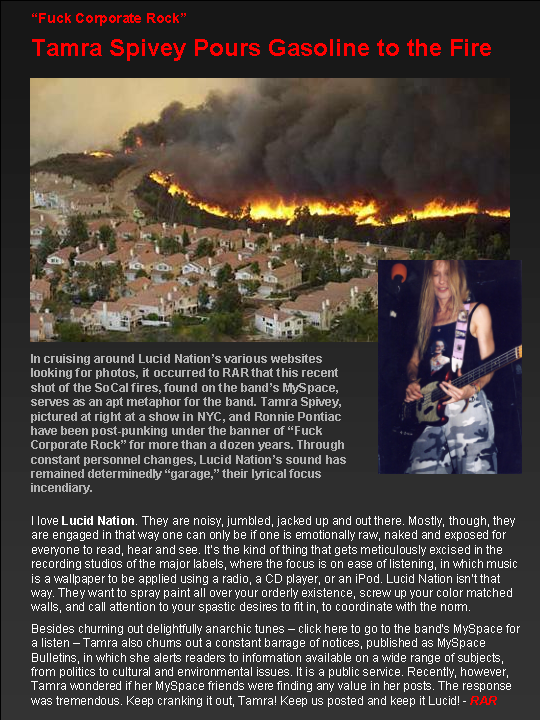 Tamra,
I truly admire your determinedly rebel, ragged nature. You made a name for
yourself improvising your lyrics in live performance, for instance. You are kind
of a high-wire artist. What possesses you to work in that way? Have you changed
over time and become more “static” in your approach, or are you still “free
styling?” Tamra,
I truly admire your determinedly rebel, ragged nature. You made a name for
yourself improvising your lyrics in live performance, for instance. You are kind
of a high-wire artist. What possesses you to work in that way? Have you changed
over time and become more “static” in your approach, or are you still “free
styling?”
Freestyle started when we finished our
set and nobody wanted to go home at one of our regular gigs at the Impala in
Little Tokyo, Los Angeles. I laughed and said "what do you want us to do,
make stuff up?" And we were encouraged to. I knew that Patti Smith, the
freestyle rappers, Jim Morrison had experimented with that so I tried. Once you
figure out how to do something you turn out to be good at, and everyone's
impressed, you want to do it more. My experiments were good enough that serious
poets like Randy Roark took me under wing and nourished intellect and ego,
introducing me to big inspirations like Gertrude Stein. As I got better I found
my unconscious was the superior lyricist. Today I do both freestyle and
songwriting. I also like to take freestyle music by my musicians and find the
song in it, the results can sound like a carefully arranged mood piece. It's
like looking at a blank canvas and seeing the painting suggested by the subtle
shadows.
I recall reading a quote from Pablo Picasso that went
something like “to paint, you must close your eyes and sing.” This closely
parallels a quote I read of yours that states “free styling allows the part of
the mind that dreams to sing.” Picasso’s fragmentation art also puts me to
mind of your own audio deconstructions. Was he an influence? Who inspired you to
approach your art as you do?
People who said I couldn't. Anyone who
doubted my intelligence. I tend to work off of negative feedback. But in the
riot grrrl scene where I became a singer Guy Debord, Deconstructionism, Barbara
Kruger were all around. We were hanging with Warhol superstar Holly Woodlawn,
backing her up at a few live shows, so Warhol was on my mind, too. And the pere
ubus, man and band. As I got deeper into my art I was inspired most by Kerouac,
his fearless descriptions of reality, his humane and humorous rhythms, and by
the lavish wordplay of Gertrude Stein, who taught me there are no mistakes, only
happy accidents.
You have talked about “facing your fears” as key to
unlocking your creativity. What fears initially drove you to start down your
artistic path? Have those been assuaged and replaced with new fears? And if so,
what are they now?
Fear drove me away from art. I was
silenced. I was a mouse. Shut up Spivey was my name. My family always told me I
was stupid, at best, weird, and thereby imperiling my only possible career
choice: waitressing. Seeing arrogant boldly self satisfied illiterates acting
like they had the world by a testicle because they could play guitar, knowing
they weren't any smarter than me, I decided since I couldn't challenge them, I'd
challenge myself. But at first I didn't want to sing. Riot grrrl gave me back my
voice by giving me so many examples of girls facing their fears, so I faced
mine. Have my fears changed? Are you kidding, with this administration? I didn't
used to be afraid to tour, but then I didn't used to get death threats.
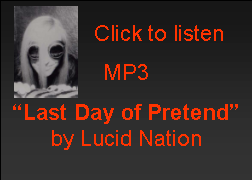 I find an actual holistic quality in your work, which for
me includes everything from your music to your writing, art, political and
social activism, and now your filmmaking. It feels all of one piece. Am I
getting that right? Do you look at it that way and, if so, can you talk about
your underlying philosophy and how it affects your approach? I find an actual holistic quality in your work, which for
me includes everything from your music to your writing, art, political and
social activism, and now your filmmaking. It feels all of one piece. Am I
getting that right? Do you look at it that way and, if so, can you talk about
your underlying philosophy and how it affects your approach?
The flavor in everything I do is there
because I don't self censor according to the demands of corporate culture.
Almost everyone can't help but deliver an edited version of self in today's
society. There's a lot of concern about how things are supposed to be, but
scratch the surface and they never are. So why conform to that? In my art and in
my life I strive to avoid arbitrary restrictions. So far I've been able to
survive, even prosper, as an outsider. These are good times for outsiders, even
the most entrenched corporate powers feel like dinosaurs, as much as they try to
stomp us mammals underfoot their pea brains realize we are built for the future.
You seem to think in terms of narrative forms. Are you
primarily a writer?
The basic function of human beings is
story telling. That's my aim in any media.
I love that you seem miffed by cliché, that you seem to
suspect that people fall back on cliché to cover inability or unwillingness to
confront their realities. Do I get that right?
Yup. Also I enjoy turning cliches inside
out. By repeating a cliche with different emotional emphasis, or by twisting a
syllable you can bring out a different meaning. Gertrude Stein thrills me with
that, no one does it better, but I was doing it naturally before I was
introduced to her work.
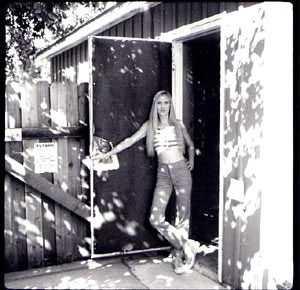 You
have talked about a shared understanding that you feel when working with other
musicians. Is there a similar commonweal understanding within the “civilian”
population that you feel can be tapped for “good”? Is that what your
extraordinary engagement – your blogs, music, artwork, filmmaking - is all
about? You
have talked about a shared understanding that you feel when working with other
musicians. Is there a similar commonweal understanding within the “civilian”
population that you feel can be tapped for “good”? Is that what your
extraordinary engagement – your blogs, music, artwork, filmmaking - is all
about?
There's a collective awareness that we
have strayed down a terrible path and I think everybody feels it in different
ways. When I blog and bulletin about things that bother me I feel a sense of
community and so do my readers. Common ground. Common sense. Common expression.
Riot grrrl taught me nothing is more powerful than sharing the truth,
reacquainting people with reality in your neck of the woods. Aristotle
considered that the definition of art whatever the media.
If somehow you could trigger the imaginations and the
shared, if submerged, motivations of each member of your community of
like-minded souls, what would Tamra World be like?
Clean water. Clean air. Clean food. Good
education. Well cared for animals, including all human varieties. Kibble for
everyone. Lots of playtime. Much purring. But actually, the more I think about
Tamra World the more frightened I become. Because, make no mistake, there would
be some serious ass whooping. Ah, yes, I'm merciful but I'm vengeful. On one
hand I love justice, intoxication, music, books, sex, healing, on the other I
like to bring down some pestilence and wrath. Invincible justice as an immediate
demonstration, rather than the slower more tedious processes of law or karma. We
are living in the instant gratification age, after all.
Are you an optimist?
As Ben Franklin said more or less I'm a
pessimist so I have only pleasant surprises. Doom is a good business. But when
you consider the kinds of challenges our ancestors faced and with far fewer
tools, like plague for example when they figured killing cats was the answer.
Oops, the rats multiplied and so did the plague. Or some of Abe Lincolns
relatives who were all wiped out when their milk cow nibbled on a weed poisonous
to humans but not bovines. We survived despite all that. I believe in human
ingenuity. We've all got to shake off this millennial doom and gloom hangover
and roll up our sleeves.
On the metaphysical side I believe soma
sema, the body a tomb. So there's always a happy ending, liberation from the
angst of soul in body. I figure we've all been here before. It's a school. Well,
sort of a kindergarten mixed with a prison, a kinderprison, but that's another
story.
You seem to work with “concepts,” like your “Hundred
Song March”. Tell me about your concept of an “ongoing and archived”
musical autobiography? And why should every artist have one?
I think there's nothing more interesting
than watching an artist develop. And for the artist what could be more
satisfying than having absolute control of one's own archive? I like reading
what clever writers have to say about artists, I found a lot of guidance in the
writing of Lester Bangs, for example, but I prefer to know what the artist
really thinks, what was really going on when art happened. I wish I had archives
like that for Jim Morrison, Jimi Hendrix, Patti Smith, can you imagine? What
about The Beatles? Or John Lennon's own hand made archive?
Also the archive is a direct relationship
with the music audience. No need for record companies or any of that old school,
tedious bullshit filled with parasitic infrastructure. Make your art. Share your
art. Someday I hope the audience will wake up and seize this opportunity and
then it may become possible to make money at this. But the money isn't as
important as making art and artists free.
As for the 100 Song March, right now it's
just a pile of archived bulletins and MP3s, but soon we'll have a more user
friendly version.
You ripped Wired Magazine pretty good on their piece on
“The Future of the Album,” and on their putting Beck in a position to speak
as an authoritative futurist on the subject. My understanding of your point of
view is that Beck, who has long been at the trough of a major label, probably
has tainted vision. As one who has fought loudly against “corporate”
fill-in-the-blank, what do you feel the future holds as to how “music product”
will be delivered?
All media content, not just music, will
be digital. Different demographics are reacting at different speeds. Country
fans still buy CDs. Fans like ours stopped awhile ago. I think there will still
be a small but steady market for limited edition customizable collector's items
such as vinyl records if you make good art. Pre-subscription would be an
interesting model right about now.
 Certainly
a corollary of equal importance to product delivery is product selection. Isn’t
that, in the Internet age, the nut of the issue? Won’t demand and
discrimination decide our future now? Certainly
a corollary of equal importance to product delivery is product selection. Isn’t
that, in the Internet age, the nut of the issue? Won’t demand and
discrimination decide our future now?
Yes, the Internet lacks filters. But
information and entertainment spread virally. It's harder to manipulate
attention these days. To think you used to be able to put a poster up on a
telephone pole! Now you have to navigate the prejudices of your world wide
audience, to avoid the instant dismissal so many internet perusals result in.
It's all part of the decentralizing process computer technology created. The
world where one star could straddle all demographics is long gone. No matter how
many media monopolies afflict us the mono-myth media is dead. Notice Brittney
Spears escapades get more news than any current musical performer. Music is
wallpaper, devalued by years of corporate abuse of the provider and consumer
alike. But real music finds it's own way. The mother crane softly calls her
chicks among the cat tails is the hexagram I always got when lusting for
results.
As we become a global, niche culture, doesn’t our focus
as purveyors of “art product” become more about assisting buyers to
discriminate “intelligently” and in our own favor? This sounds like tricky
business, as the only way to make any money in a world of niche markets is to
somehow form coalitions of the similarly minded. This is what the media giants,
and few others, have the means to do. Will infiltration not work?
I've had meetings with powerful media
people and they all know it's inevitable that their monolithic distribution
channels will be transcended. It's one reason they spend fortunes trying to
control the Internet and end net neutrality. It's going to happen. A band, a DJ,
a movie, some work of brilliance will shine and enough people will recognize it,
the anti corporate sentiment raging in our society will drive it. If fifty
thousand people sent twenty dollars to their favorite diy director or band
that's a million dollars and a disaster for corporate media. I have a friend who
works high up in the Wall Street world. He compares today's media monopolies to
the buggy whip monopolies just before Ford launched the automobile. Infiltration
won't work because it's too late to infiltrate. That's like stowing away on the
Titanic!
Calculated effort toward mass success is
very different from art. I know musicians have to think like business men now
more than ever but you can't lose the fact that music is magic. You have to have
faith in the unknown. Elvis didn't know they'd invent the 45 and the player to
go with it just in time for little girls to have their own world in their own
little room. He just went into Sun and sang for his mama. Everyone is so aware
of media these days, and of marketing. But a website is truly no different than
a street vendor's cart. You can scream all about your great fish heads at the
top of your lungs, form a guild to corner the market, and put a clever picture
and name on your product, but if the guy across the street has fresher fish
heads you're out of business.
Of course, building legions of fans requires that the
product being sold has some quality or aspect that serves as the unifying common
denominator for a divergent range of people. That takes us back to “corporate
music” and why so much effort is spent trying to find that “hit” thing
that works for the greatest number. One could imagine that being something of an
art in itself. Or is that a “y” in the road type of decision carrying the
risk of rationalizing a sell-out? Can you conceive of yourself writing Tin Pan
Alley style, competing like a pop vendor? Like a music row pro?
 I
don't like competition and office politics in art. Way to turn what gives you joy into
a bleak and hopeless grind, ala Kurt Cobain (and all the way back to Syd Barret).
It's natural for artists to envy each other, but the difference between
inspiration and competition is galactic. As for the demographic home run of a
hit song I think common denominators can be touched without sacrificing depth
and individuality. I
don't like competition and office politics in art. Way to turn what gives you joy into
a bleak and hopeless grind, ala Kurt Cobain (and all the way back to Syd Barret).
It's natural for artists to envy each other, but the difference between
inspiration and competition is galactic. As for the demographic home run of a
hit song I think common denominators can be touched without sacrificing depth
and individuality.
I'm currently at work on the songs for
Mommie Dearest the Musical. I hate musicals and I hate Joan Crawford at least as
played by Faye Dunaway, but Frank Yablans asked me to write it. That's as close
to Tin Pan Alley as I'm ever getting.
It is probably worth noting that you aren’t exactly
living in the forest off what you can rob from passing nobles. Aren’t you a
professional editor? (Come to think of it, as a guy who does that himself, that
is kind of like living in the forest off what you can rob from passing nobles.)
I figured awhile back I was not going to
make money at music and still love making music. I don't like repeating the same
songs over and over which is what's required in mass marketing which is the only
way to make serious money in the music business as an original rock singer. I
chose to love music. I've done alot of different jobs: bank clerk, toy store
clerk, warehouse worker, messenger. Then I became art editor then a senior
editor at Newtopia Magazine. Next I got into film and other media projects.
Here's one of my favorites:http://kids.yahoo.com/experiences/skrumps . I'm not
involved in the creative side but I helped get the company started, from
meetings to movingboxes! But these were all ass backwards things that happened
to me. Good turns of fate.
I find it charming that you talk about preservation of
one's soul, i.e., avoiding “selling out” to the corporate media. The old
hippie in me – I ate one and realized a disappointing aftertaste – finds
this odd coming from a punk. Are we in a battle here for something worth
keeping?
Charming? Fuck you, man! Actually, you'd
be surprised how many punks are the most mystical motherfuckers you'll meet on
the block. Of course, there aren't as many as there used to be. Some didn't make
it to be here with us today. Others went the way of the pod people. But I always
thought hippies and punks were on the same side of the fence. And someday we may
be, since homeland security apparently agrees with me. (You see, how these
rhymes flow free, so effortlessly?)
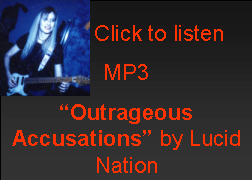 You
have talked about how “universally available” technology now allows everyone
to create and distribute their work independently, and certainly you share with
RARWRITER.com the idea that this is a good thing. But why is it a good thing?
Doesn’t giving tools to chimps just guarantee that the world will be filled
with greater depths of mediocrity and in turn make it more difficult for the
good Lucid Nation stuff to be seen or heard? You
have talked about how “universally available” technology now allows everyone
to create and distribute their work independently, and certainly you share with
RARWRITER.com the idea that this is a good thing. But why is it a good thing?
Doesn’t giving tools to chimps just guarantee that the world will be filled
with greater depths of mediocrity and in turn make it more difficult for the
good Lucid Nation stuff to be seen or heard?
Wasn't commercial radio the same thing as
soon as the suits arrived in force? That's why the true believers cling to the
Jim Ladds out there, the last remaining embers of a time when radio was free and
visionaries stalked DJ mics. Isn't that what happened to television? The brief
golden age of freestyle comedy and gripping drama entranced the mono myth
audience, but look at it now. Everywhere in nature the richest vein, from gold
to jugular, attracts the most predators.
In tribal culture everybody makes songs
so I welcome all the musicians out there. I believe everyone is a musician, your
heartbeat is a drum. If the price of everyone making music is a few of us not
being famous making music, that's okay. Music makes for a healthier society. I
know I once considered myself that chimp without tools, it seemed important to
everyone at home and at school to make sure I understood that. So more power to
the chimps, and more tools.
I love A Girl’s Guide for Taking Over the World... Would
we earthlings be better off if women were in control? Please explain.
You've obviously never been on the road
with a girl band! I'm not a feminist, I'm an equalist. Gender is like an
electrical current, you need the right balance to unleash the energy, too much
of either polarity and there's a short circuit. I don't mean that sexually or
romantically, I mean that governments, companies, and nations that balance
gender will have phenomenal advantages because the entire creative resources of
humanity will be theirs, instead of only half.
One of the wonders of doing a virtual interview like this
is that while I am talking to you I am looking at your artwork, which I am
really enjoying. How did you get into the fine arts? Can you talk a little about
what you are up to now in that realm?
I've painted as far back as I can
remember. Then I got taken to museums as a young child. Those Gainsboroughs left
an impression! But what really got me going was running into the work of Ed
Kienholz, That's when I started thinking in terms of surreal assemblages. To
capture the tragic and funny at the same time appealed to me. Lately I've been
really into the textures of mediums like glass beads, clear tar gel, fine and
coarse pumice, and metallics. For awhile I was in a slow animation phase, using
phosphorescence and tricks of light to create the illusion of change in a static
canvas. But now I'm after capturing complex organic patterns.
What is up these days with Lucid Nation?
We got a Toft ATB24, a couple vintage
Pultecs, one from the original Motown, and enough outboard and recording gear to
turn our rehearsal space into a decent tracking room. Nitebob loaned me his
Neumann. The result is 26 new songs. A variety of styles with a variety of
musicians. But we're still laying down final vocals so I've only released a few
rough mixes.
You are now an Associate Producer on The Gits Movie, which
has been well received in limited distribution. Would that be correct to say? Is
your role to raise awareness of the film and find capital to ensure broader
distribution?
I introduced Gold Village, the film's
co-executive producer, giving us the resources for a re-cut that will include
never before seen footage of The Gits and interviews with people like Kathleen
Hanna and Joan Jett. Liberation Entertainment, the distributor, was on board
before I got there. I help out however I can. From going over the movie editing
with the director and producer to doing some of the calling and emailing. Our
MySpace friends came through in a big way.
Would you talk a little about what it is about The Gits
that has you so invested in the success of the film
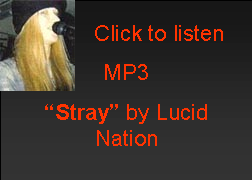 What
happened to Mia happened to me except I survived. I think the film speaks to an
agonizing crisis at the center of most societies. It's time for human beings to
evolve past this surreptitiously tolerated abuse of an entire gender. I know
many people, including women, think women are equal in America and much of the
world today, or even privileged, but rape statistics prove otherwise. What
happened to Mia happened to me except I survived. I think the film speaks to an
agonizing crisis at the center of most societies. It's time for human beings to
evolve past this surreptitiously tolerated abuse of an entire gender. I know
many people, including women, think women are equal in America and much of the
world today, or even privileged, but rape statistics prove otherwise.
I am reading through your constant stream of bulletins on
MySpace, and your blog entries. You are the off-spring of a Marine father and
your political interests might seem at odds with such an upbringing. Were you a
rebellious teen who turned it into a lifestyle? What motivates you to be so
counter-culture, if I read you correctly, and yet so involved?
Spoiling dinner for dad was a worthy
goal. But I was a fourth child, ten years younger than my nearest brother, who
being a sociopath Marxist queer extrovert, had exasperated dad pretty good by
the time I got there. Dad worked the night shift. Mom worked the day shift. I
was on my own. Is it counter-culture to be bored by mass media and its same old
same old? Is it counter culture to not want the pain in the ass of dealing with
the back end of mass media to have a so called career? I think mass media is
counter culture, it's against culture.
Would friends say that you are “fun” to be around? Or
are you ever serious and intense?
I think I'm a delightful breath of fresh
air. Dammit. Actually, I like to laugh, and I give great relationship advice. I
crack jokes, usually sarcastic one liners, probably caused by early exposure to
the comedy of Lily Tomlin and Bill Hicks. At times I'm not so much serious and
intense as withdrawn and disinterested. It's not personal, it's a Capricorn kind
of thing. However, I'm not fun to record with. I take it very seriously and it
gets very intense. I have to fight to get to where I need to be every time.
There's still all those ghosts running around in my head telling me I'm a chimp.
Without a tool.
Do you have a personal pursuit without artistic value but
important to you nevertheless? What is it?
corralejo tequila and mint shermans
|

TAMRA'S BULLETINS
Anyone familiar with
Tamra Spivey's life on MySpace knows that her fascinations are wide
ranging. She keeps friends apprised of social, political and artistic
issues through a constant stream of issue-related Bulletins, a recent
sampling of which is included below:
British
plan to build training camp for Taliban fighters
Can't
Pay Your Mortgage? Trash Your House and Leave
Bombs
Away over Iraq
Welcome
to America ... You're Under Arrest
Military
contractors are hard to fire
Obama's
Record on Choice is Clear
Afghan
Student Sentenced to Death for Reading Women's Rights
Violence
Draws Veil Over Iraqi Women
Ann
Coulter: McCain would make me a 'Hillary girl'
MySpace
deletes hacked Web site for atheists and agnostics
Hillary
and Obama Ignore Drug Reform
RIAA
moves to screw over musicians some more
Have
You Seen a Woman Director Lately? by Melissa Silverste
Thirty
Ways of Looking at Hillary
Journalists,
bloggers are threats in terror drill
The
Supreme Court Forgets the People
Hillary
Clinton: The New Nixon?
Sibel
Edmonds: heroic whistleblower
Smirk
of the Union
Super
Bowl of Shame
The
Fear Factory
Blackwater
Protesters Given Secret Trial and Conviction
Help
Snap'her and get something cool, too! Ebay treasures
If
I were growing up now I'd be drugged in Juvi
Iraqis
on "Success" and "Progress" in Their Country
Pro-Choice
Republicans Stake Claim to Their Party
How
Teenage Rebellion Has Become a Mental Illness
Goth
Videos Sunday
Report
from Texas: Warning to Female Musicians
Seeqpod!
Playable search! Enjoy it while you still can~
Bare
blonde ass could cost ABC $1.4 million
Is
Wearing Makeup a Feminist Act?
Caught
with a Bag of Weed? Could Cost More Than You Think
Thousand
College CampusesTrying to Turn the Tide on Climate
Will
Coffee Be a Casualty of Climate Change?
Detained
teen planned suicide-hijacking
___________________
THE GITS MOVIE
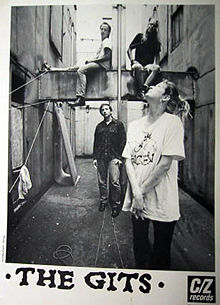
Tamra Spivey has signed on as an Associate
Producer of The Gits Movie.
The Gits
were a Seattle punk band, active from 1986 to 1993, whose career came to a
tragic end with the rape and murder of singer Mia Zapata.
The story of the Gits was made into a
documentary film, titled simply 'The Gits'. The movie, directed by Kerri
O'Kane, had its first screenings in 2005 at the Seattle International Film
Festival to an overwhelmingly positive response. A rough cut of
the film was accepted and screened at the 2007 SXSW (South By Southwest)
Film Festival held March 9th-March 17th, 2007 in Austin, Texas. The final
version of the film is currently in post production.
The movie features interviews with people
who knew Zapata and the Gits, including Joan Jett, whose song "Go
Home," written with Binkini Kill/Le Tigre frontwoman Kathleen Hanna,
is a tribute to Mia Zapata.
___________________
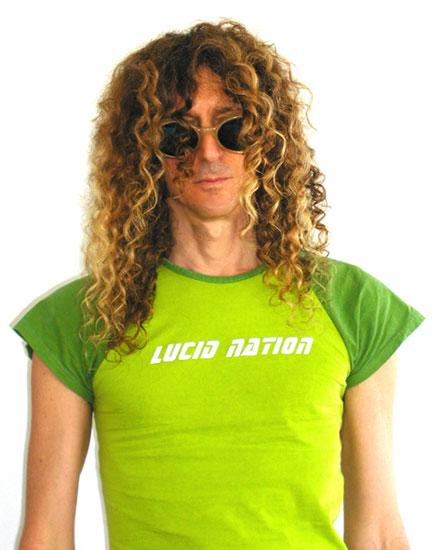
RONNIE PONTIAC
In the early 1990s, Tamra Spivey was playing in a
rock band, Cat Cult, with guitarist Ronnie Pontiac (above). They soon
formed Lucid Nation and started playing fundraisers for a riot grrrl art
collective known as Revolution Rising. That rapidly evolved into shows in
L.A.'s downtown art community. In 1994, Lucid Nation toured the West
Coast, playing seven riot grrrl conventions in one summer. Today, Tamra
Spivey and Ronnie Pontiac remain the heart of Lucid Nation. |


 Learning
from Jimmy Iovine
Learning
from Jimmy Iovine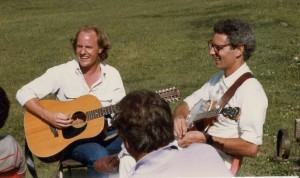
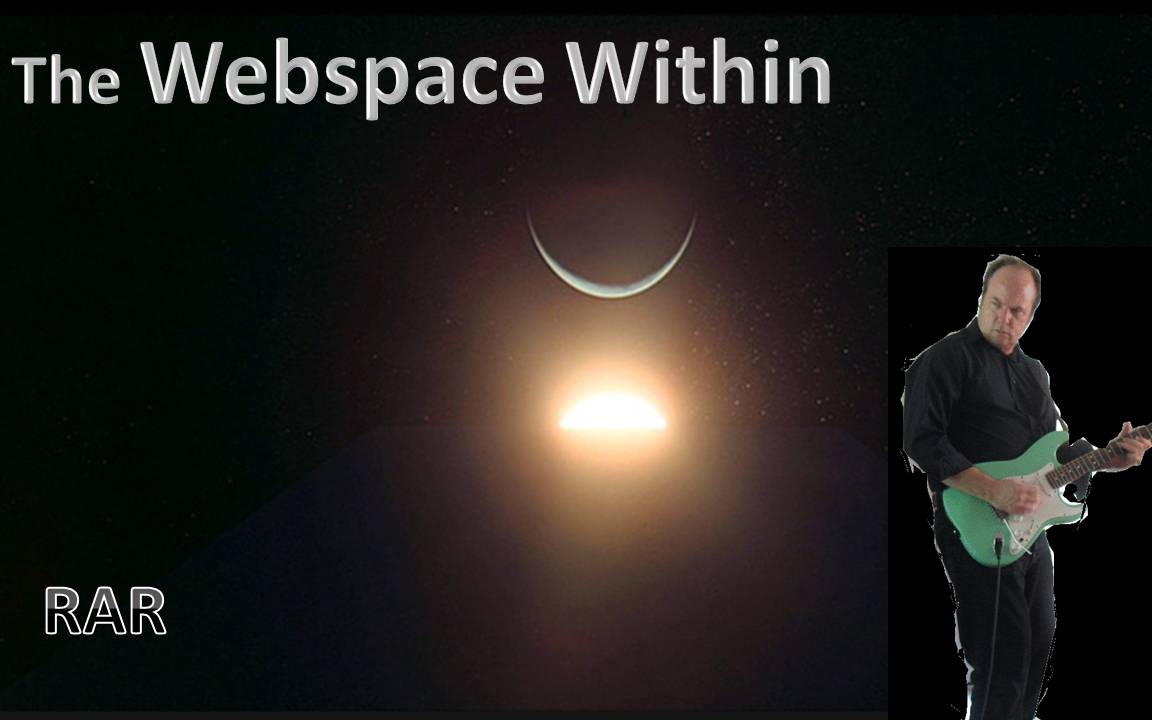
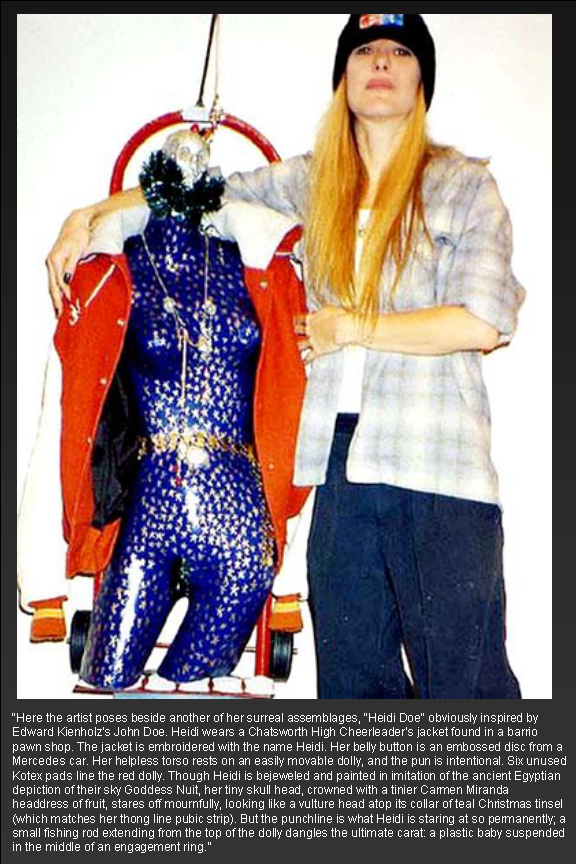 This
edition we spotlight free styling Lucid Nation punk rocker TAMRA
SPIVEY.
This
edition we spotlight free styling Lucid Nation punk rocker TAMRA
SPIVEY. 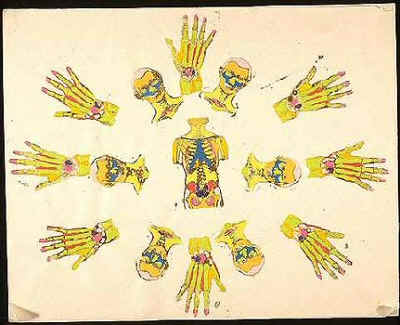 "Autopsy Stamp Mandalas"
"Autopsy Stamp Mandalas"
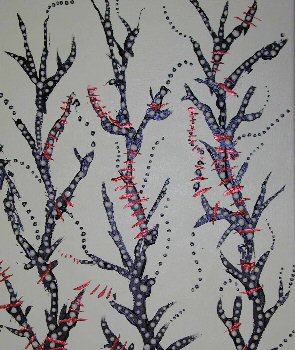
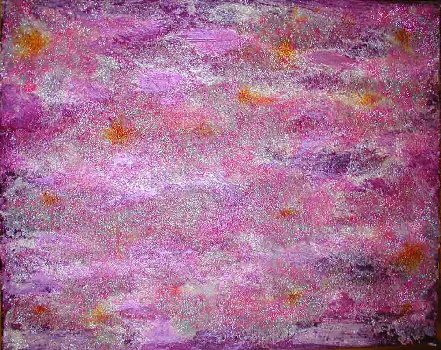
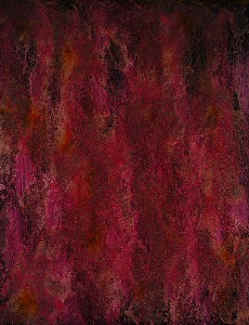 "Orpheus
by Night"
"Orpheus
by Night"


 You
have talked about a shared understanding that you feel when working with other
musicians. Is there a similar commonweal understanding within the “civilian”
population that you feel can be tapped for “good”? Is that what your
extraordinary engagement – your blogs, music, artwork, filmmaking - is all
about?
You
have talked about a shared understanding that you feel when working with other
musicians. Is there a similar commonweal understanding within the “civilian”
population that you feel can be tapped for “good”? Is that what your
extraordinary engagement – your blogs, music, artwork, filmmaking - is all
about?
 Certainly
a corollary of equal importance to product delivery is product selection. Isn’t
that, in the Internet age, the nut of the issue? Won’t demand and
discrimination decide our future now?
Certainly
a corollary of equal importance to product delivery is product selection. Isn’t
that, in the Internet age, the nut of the issue? Won’t demand and
discrimination decide our future now?





